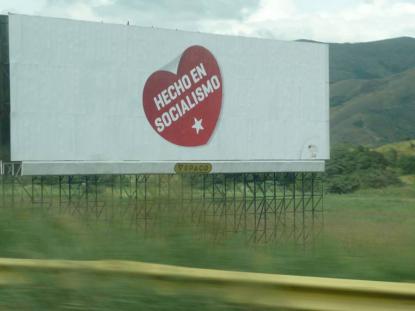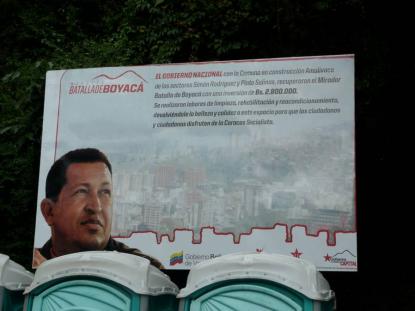
I was sitting in the make-up chair for the morning news show at Globovision, a large cable network station in Caracas, Venezuela a few weeks ago. As the assistant touched up the liver spots on my bald head (they form the shape of the Hawaiian Islands to exact scale), I was thinking about what kind of questions would be hurled at me. What do you think of relations between the US and the Chavez government? Are you free of censorship in your country? Do you like Latin American television?
I was doubly nervous because the questions, and my answers, would be in Spanish. I can make myself understood in Spanish but rapid-fire questions throw me. I asked the interviewer in the warm up (the interview was going live in five, four, three, two, one seconds), to please speak slowly. She assured me that I would understand every word.
Then the red camera lights went on and she began questioning my fellow filmmaker, Aaron Woolf, whose Spanish is perfect. That gave me a breather until she turned to me and without even touching her high-fashion footwear to the linguistic brakes, blazingly asked me….something which contained only two words that I could pick out: Michael and Moore.
Luckily, I didn’t need to hear the whole question to know what she was asking about. Context is everything when faking it in a foreign language and I knew that she wanted my opinion about America’s most controversial documentary filmmaker. I replied that Moore’s films were more about Moore than the subject matter and we moved on to why I was in Venezuela in the first place.
I was in Venezuela, and Colombia for two weeks before, as part of the American Documentary Showcase (ADS). The showcase is a cooperative program with the Bureau of Educational and Cultural Affairs of the US Department of State, and administered by the University Film and Video Association. The ADS sends about thirty filmmakers a year to countries around the world to do workshops on the American approach to documentary filmmaking. The countries don’t necessarily have an easygoing relationship with the USA. In fact, that’s the point. According to the ADS, “The goal of the Showcase is to offer a broad diversified look at life in the United States and the values of a democratic society as seen by American documentary filmmakers. The Showcase is intended to demonstrate the role documentary plays in fostering understanding and cooperation among people.” Hence our programs in Colombia and Venezuela.
 The question about Michael Moore was one that Aaron and I were to hear over and over again. The reason was that Moore’s films are highly critical of US policies and many members of our audiences simply could not believe that our country would let him get away with it. The questions at Globovision were particularly pointed. President Hugo Chavez forced the shut down of Venezuela’s major opposition television station last year. Globovision is no friend of Chavez and they are next on the chopping block. In fact, while we were in the country Chavez claimed that the chief of Globovision had raised one hundred million dollars to assassinate him. “Something must be done,” Chavez ranted.
The question about Michael Moore was one that Aaron and I were to hear over and over again. The reason was that Moore’s films are highly critical of US policies and many members of our audiences simply could not believe that our country would let him get away with it. The questions at Globovision were particularly pointed. President Hugo Chavez forced the shut down of Venezuela’s major opposition television station last year. Globovision is no friend of Chavez and they are next on the chopping block. In fact, while we were in the country Chavez claimed that the chief of Globovision had raised one hundred million dollars to assassinate him. “Something must be done,” Chavez ranted.
No wonder that censorship was on the mind of the newscasters. I had one memorable conversation with Venezuelan students who simply could not believe that the US government did not censor our work. I explained that we had a constitution with a Bill of Rights, a tradition of a free press, and multiple outlets for our work. The students shot back, “Will the government pay directly for films that are critical of its policy?” Well, not usually, but at least we can try to raise the money elsewhere without the threat of violence or imprisonment. “But who will show your films if they are anti-government?” “Has anything you produced ever helped change government policy?” Good questions all and a demonstration of the ability of the ADS program to spark challenging dialogue.
The questions were much the same in Colombia, but their government is on friendlier terms with ours. Still, there has been so much US involvement in Colombia politics and drug policy, that our government is not entirely trusted there by the average citizen. Both Colombia and Venezuela have had severe problems with violence, kidnapping, rising murder rates, political unrest – and sometimes these problems are blamed on US foreign policy. Some producers we spoke with were making films critical of their governments, but they were worried about censorship and reprisals. When they asked us about censorship in the United States, it was more than mere curiosity. They wanted to know just how free was our free society.
We left the Globovision studios that morning still thinking about the censorship questions. That afternoon we decided to drive from Caracas to see a baseball game in Valencia, about two and half hours away. Magallanes was playing Caracas in one of the biggest games of the season and we knew the crowd would be wild and nearly out of control.
On the way to the game we passed billboard after billboard praising Chavez’s nationalization policies. “Hecho En Socialismo” – Made in Socialism, the signs proclaimed. “Territorio Socialista 6710 toneladas al año Produccion de maiz.” – the tonnage of corn produced on appropriated land. We had spoken to many people by now who did not believe in hecho en socialismo, who, in fact, believed that socialismo was destroying the country through incompetence and corruption. They were bitter, angry and ready for a counter-revolution.
The streets outside the baseball stadium appeared to be full of revolutionaries, but they were merely crazed fans heading for the gates. We bought both a parking space and tickets from the same scalper, crammed through security checkpoints and pat downs and made it to our superb seats on the third baseline. As I sat down the man next to me grabbed my shoulder and said, “Hey, I saw you on television this morning. I want to tell you something. Outside the stadium we are divided, political enemies. It can be dangerous out there. But inside we are all united, we are all crazy fans, fanaticos, in love with our teams and this game. This is the real Venezuela, the way it should be.” That was his opinion, uncensored and apparently and abidingly true.
[For more photos of Venezuelan signage taken by Larry Hott, take a look at the accompanying photo gallery.]


